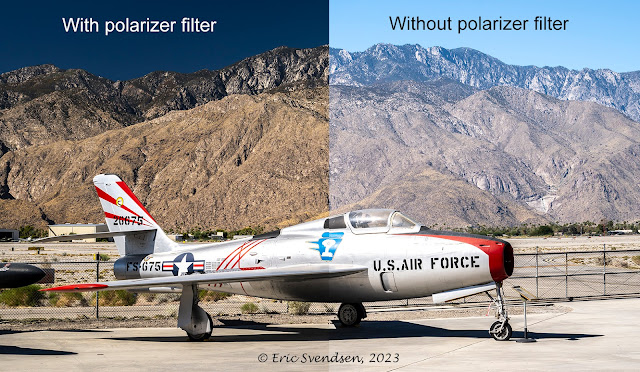The benefits of a polarizer filter.
 |
| F84F Thunderstreak jet at Palm Springs Air Museum shot with (left) and without (right) polarizer filter. |
One of my favourite filters is the polarizer. They are modestly expensive, especially for camera lenses with large filter rings, but they are well worth the investment. If you have several lenses, consider buying one for the lens that has modest wide-angle and telephoto capabilities. This often is a kit lens, something with a 28-80 mm zoom range. Although you can use them on any lens, I find there are limitations for ultra-wide angle lenses and they adversely affect shutter speeds in long lenses.
You'll notice that the photo above has a distinctive left and right side. Both sides were shot with a polarizer filter on the camera lens (a 24-70 mm lens on a full-frame mirrorless camera); the left photo had the polarizer ring rotated to produce the maximum effect. While on the right side, the ring was rotated to produce the minimum effect. In essence, one was taken with and one without the benefit of a polarizer.
The difference between the two photos is stark. The aperture, shutter speed, and ISO values were the same for both. The polarizer removes polarized light, if present, when rotated to the right place. You can see the change in the camera's viewfinder; blue sky becomes darker, reflections may disappear, and colour casts are reduced or removed altogether. You don't see the effect in all situations because polarized light may not exist. Cloudy days reduce the filter's effectiveness and shooting at certain angles relative to the sun also produces limited results. It is best to play with the filter and see where it makes a difference and if the resulting effect is desirable.
Polarizers are a pain to use if your lens has a lens hood. I always remove mine when the polarizer is in place. Since the filter is grey in colour, I often remove it when shooting indoors or when using flash. Ultra-wide angle lenses have such a wide field of view that the polarizer does not produce consistent results throughout the shot. This is why I don not recommend getting one for your ultra-wide lens, although if the filter size is the same, you can try it out to see for yourself.
Many of my best landscape photos have been taken with a polarizer. I think that you will like the results, but keep in mind they do not work in all situations.
Thanks for reading.
Eric Svendsen www.ericspix.com



Comments
Post a Comment